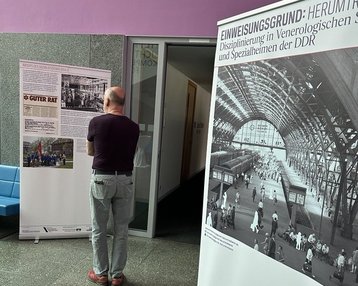
Prof. Dr habil. Maximilian Schochow from SRH University sheds light on the role of medicine in the GDR repression system in a new study.
Prof. Dr habil. Maximilian Schochow from SRH University sheds light on the role of medicine in the GDR repression system in a new study.

Between 1961 and 1989, thousands of women and girls from the age of 12 were forcibly admitted to closed venereological wards in the GDR under the pretext of a sexually transmitted disease - popularly known as "Tripperburgen". The repressive measures were officially aimed at combating sexually transmitted diseases - but in reality they were primarily used for social discipline. For example, "non-conformist" girls and women who behaved "sexually conspicuously" according to GDR standards or deviated from the norm were taken to the closed wards without a court order, where they were medically monitored and sometimes systematically abused.
Städtisches Klinikum Dresden at the centre of a new study
In addition to closed venereological wards in Berlin, Erfurt, Leipzig and Gera, there was also one in Dresden - this was housed from 1961 to 1976 in the former Bezirkskrankenhaus Dresden-Friedrichstadt, now Städtisches Klinikum Dresden. In order to reappraise the history of this ward, Prof. Dr habil. Maximilian Schochow, Professor of Medical Education at SRH University, together with Prof. Dr Florian Steger from the University of Ulm, analysed around 220 patient files from 1969 and classified them in terms of medical and social history. They were supported by the Dresden City Archive.
"In the GDR, medicine was partly misused as an instrument of social control," says Prof. Dr habil. Maximilian Schochow. "Such historical abuses must be analysed - also in order to make today's healthcare systems more sensitive to power relations and structural exclusion."
The results of the study were presented at Städtisches Klinikum Dresden in June. Among the guests were representatives from politics, science and society, including the Saxon State Commissioner for the Reappraisal of the SED Dictatorship, Dr Nancy Aris, who gave a welcoming address.
The first publications on the study are currently being planned.
Travelling exhibition also provides insights into venereological stations
The travelling exhibition "Einweisungsgrund Herumtreiberei – Disziplinierung in Venerologischen Stationen und Spezialheimen der DDR" is also currently on display at the Gera campus of SRH University. In addition to a wide range of contemporary historical photos and sources, interview excerpts from those affected and experts will also be shown to document the state repression against girls and women in the GDR.
The exhibition will be on display at the SRH Campus Gera until 4 July 2025 (opening hours Monday to Friday from 10 am to 6 pm). Further stops are planned for 2025 in Rostock, Berlin and Dresden.